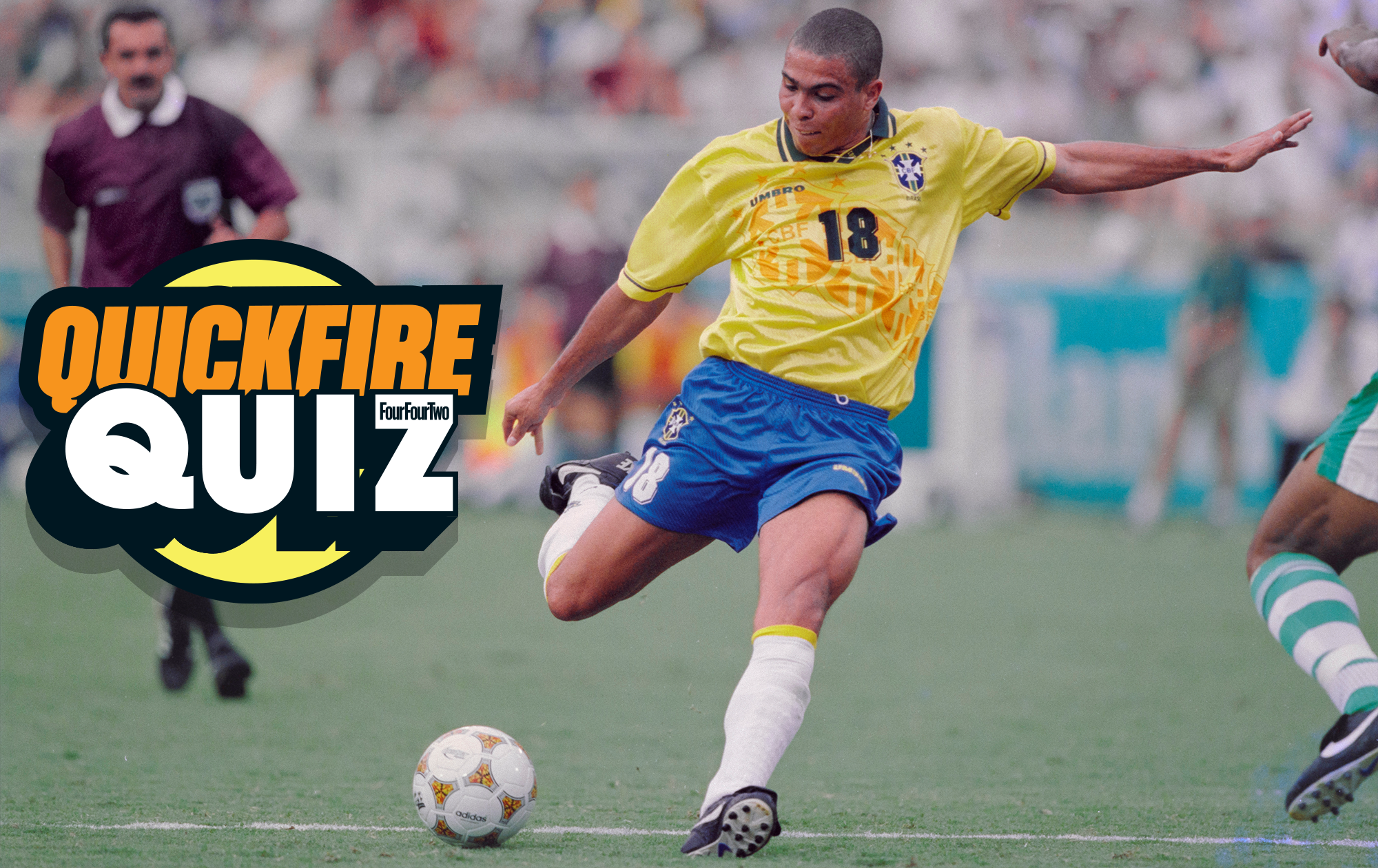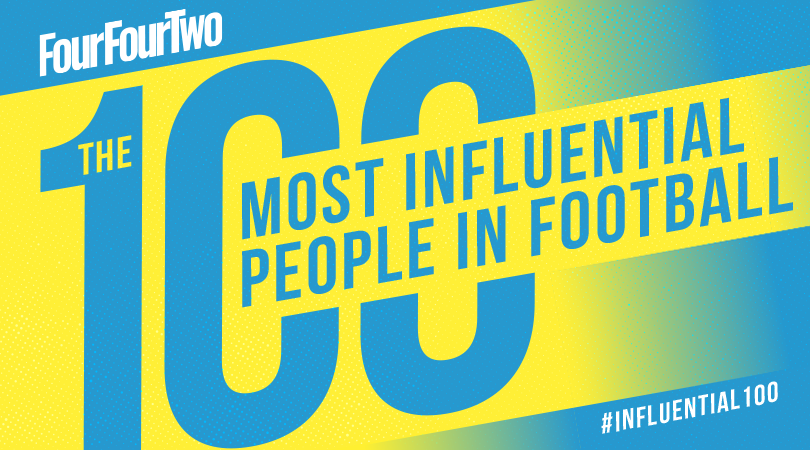
Words: Alex Hess, Jeff Kassouf, Michael Yokhin, Seb Stafford-Bloor, Amit Katwala, Mike Holden
80. Gareth Southgate
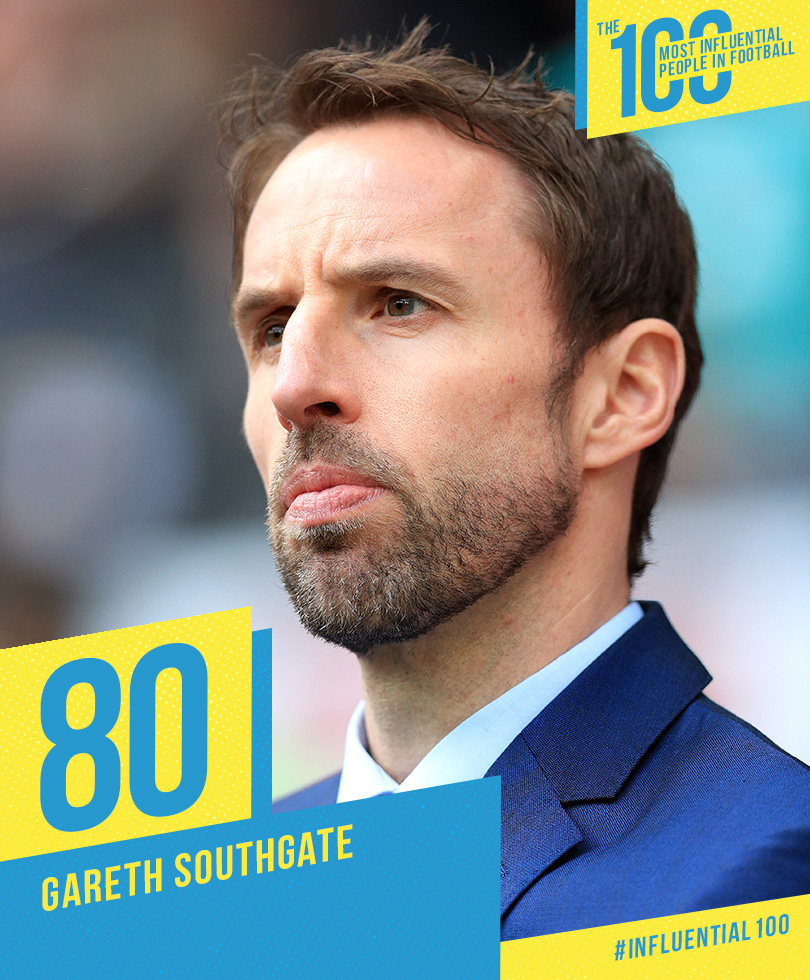
Part of the intrigue around Southgate’s recent appointment to England manager lay in just how influential he would prove to be. Time will tell whether he is indeed the thinking man’s England manager, given scope to cultivate a coming generation of talent, or simply the next patsy to be sacrificed once the national game’s top-down deficiencies are laid bare in another tournament humiliation.
Either way, Southgate earned his promotion through many years of diligent background work at the FA – first as head of elite development, then as manager of the under-21s. This has led to questions over whether he had the ruthlessly critical head required to turn around the oil tanker that is the senior team, though such questions are tinged with cynicism and presumption.
For now, Southgate’s coaching career has rather neatly mirrored his time as a player: assiduous, unassuming, unspectacular – but quietly and impressively authoritative. AH
79. Diego Maradona
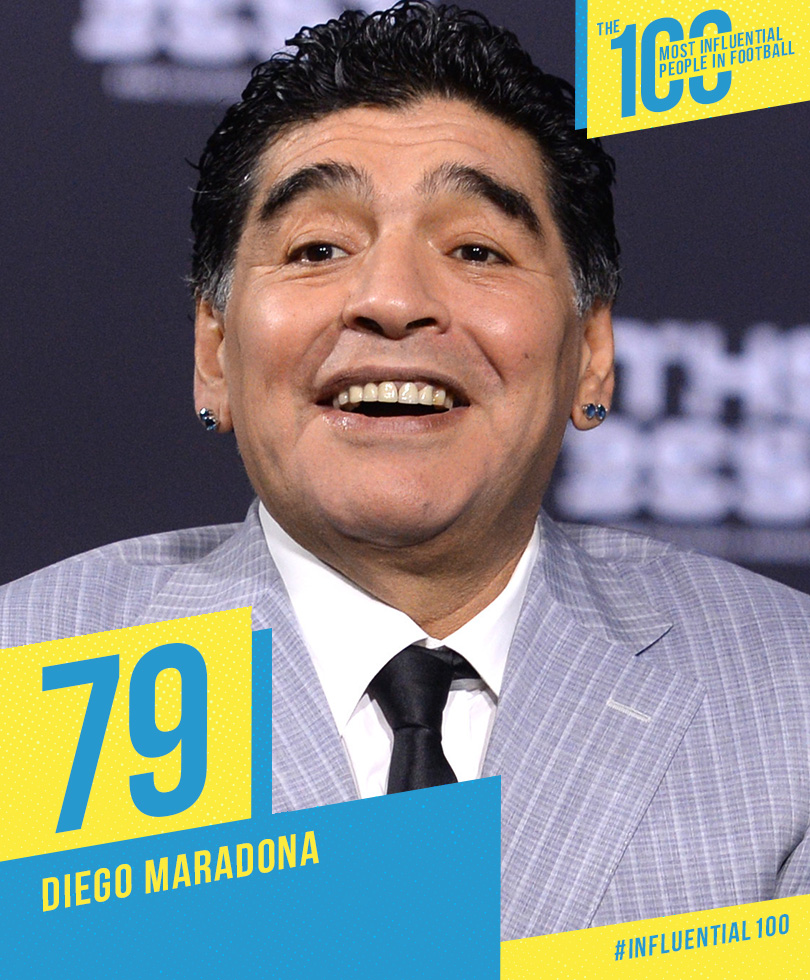
Whenever Diego Maradona has an opinion, we usually get to hear about it. And when that opinion concerns Lionel Messi, we usually read between the lines of what he’s actually saying to get to what we think he means. In short, his words make great copy, no matter how paltry the offering.
The best features, fun and footballing quizzes, straight to your inbox every week.
At the crux of it all is a perfectly natural desire to protect his own status as arguably the greatest player of all time, serving Messi’s best interests for the sake of the national team only up to a point.
Earlier this year, Maradona – ever the angel during his playing days, of course – emerged to refute claims that he had privately supported Messi’s four-match ban (later reduced) for a foul-mouthed tirade at a linesman during the World Cup qualifying win against Chile.
However, his indignation at the accusation wasn’t entirely convincing and it came with a comparison to "Portugal losing Cristiano", thereby perpetuating the idea that today’s little No.10 isn’t one of a kind. MH
78. Diego Simeone
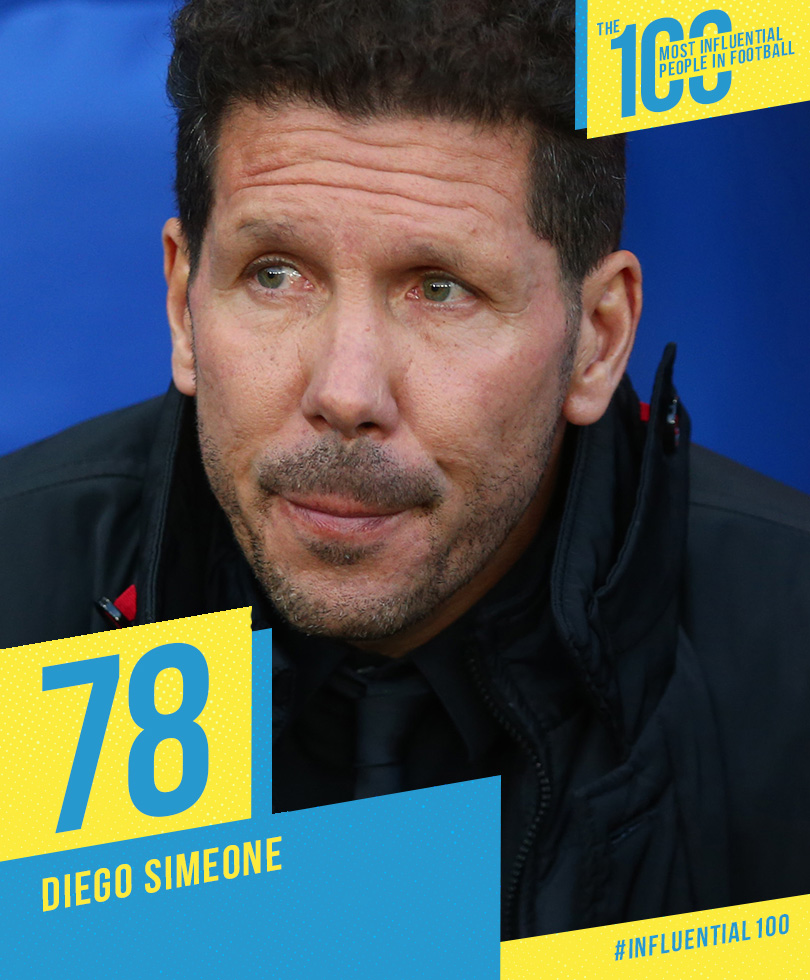
The bond between Simeone and Atletico Madrid is more than just any manager-club relationship. Given where Atleti were when the former midfielder returned to the Vicente Calderon in December 2011, there’s no other coach in the world today so inextricably linked with a club and its success.
So plenty of hearts are going to be broken in the Spanish capital at some stage in the next year or two – there’s simply no other way to interpret Simeone’s decision last summer to reduce his current contract by two years. In the wake of a season that hasn't quite lived up to the previous five, his departure might well happen this summer.
Inter, another former club, is the most obvious destination. The Italian giants are struggling to make the impact desired by their new Chinese owners and Simeone has made no secret of his desire to manage them one day. MH
77. Xi Jinping
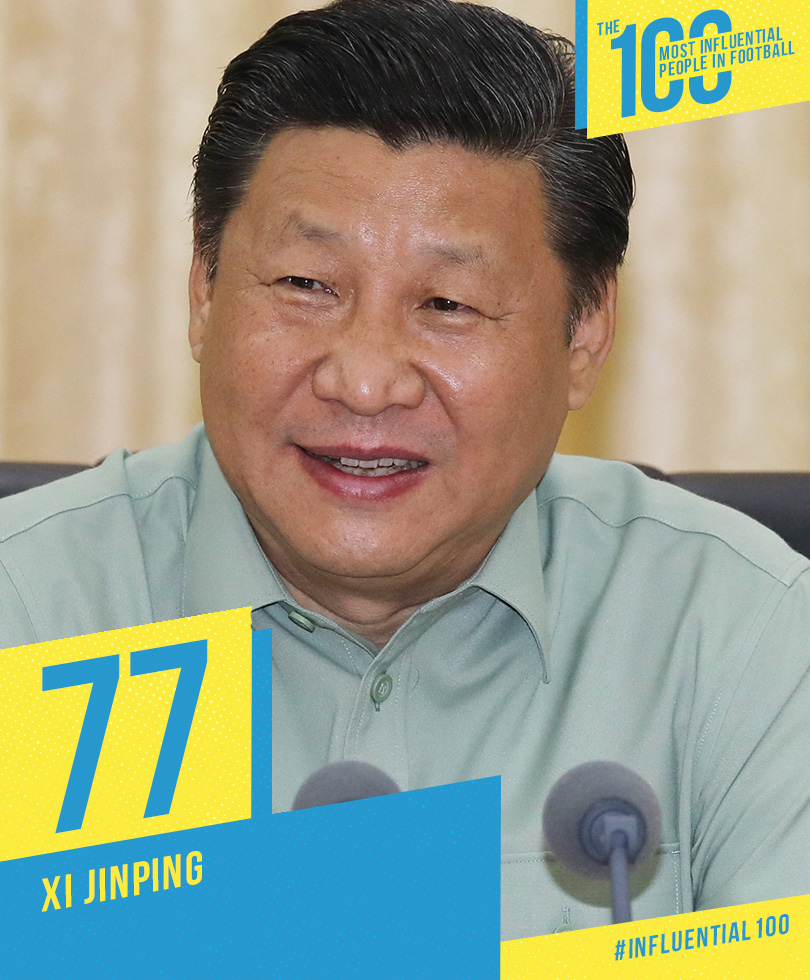
The Chinese Super League may commonly be presented as a vanity project, but it’s really the visible part of something much textured. China has real intentions to become a global player in the sport and president Xi is that movement’s standard bearer.
During his reign, football has found a place on the national curriculum that Xi is personally invested in. He has a trio of ambitions: to qualify for a World Cup, to host the tournament and then eventually win it.
That’s not as outlandish as it sounds either, especially not after glancing at images of the Evergrande International Football School in Qingyuan (the world’s largest of its type), and learning about the impressive infrastructure that China is rapidly building underneath its flagship league.
Xi wants to be a visible figure in the game and it will be foolish to bet against him or his country doing just that. SSB
76. Javier Hernandez

It’s hard to overstate just how popular Mexico’s national team is in the United States. In many of regions, particularly near the U.S.-Mexico border, it’s the more popular team of the two, and why you see El Tri play so many Stateside friendlies, consistently filling NFL stadiums with fans.
For those reasons, Chicharito may well be the most influential player in Mexico and the U.S., a grip that will only get stronger should a rumoured move to MLS come to fruition in the next year.
Chicharito is already Mexico’s joint-top scorer of all-time before turning 29 years old. His time in Europe has proven that he is capable at the highest levels, and it has only increased the reverence for him among Mexico fans. Unofficially, he’s North America’s most popular player. JK
75. Tite
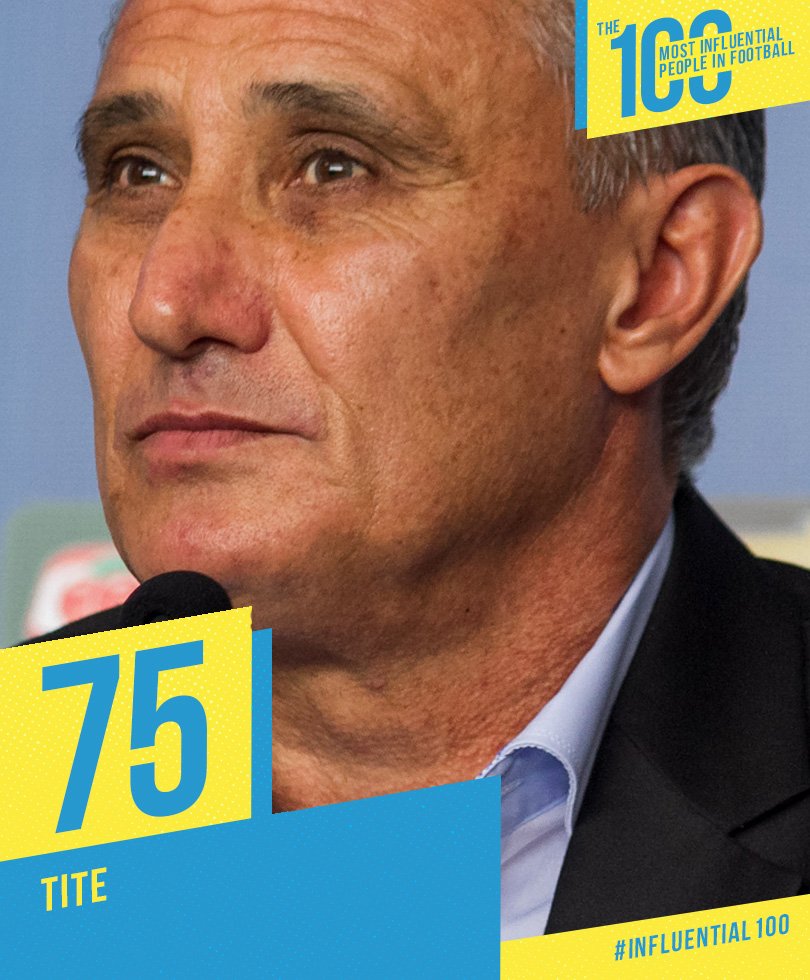
Quite simply, Tite helped the Brazil national team to find the identity that had been lost a long time ago. For years, the country suffered under coaches like Luiz Felipe Scolari and Dunga, whose principles clashed with tradition.
But smiles returned to fans' faces after Tite took over in June 2016, and the Seleção are now playing free-flowing, enjoyable football reminiscent of the great Tele Santana days.
Results have been outstanding. A year ago, it looked like Brazil could be in danger of missing out on the 2018 World Cup, but Tite led them to eight wins in a row to wrap up qualification for the tournament with four fixtures remaining.
This could be the first World Cup since the ‘80s in which Brazil play a traditional, attack-minded brand of football, and they can be considered one of the early favourites to lift the trophy. Tite's importance shouldn’t be overstated – he's absolutely crucial to the project. MY
74. Greg Clarke
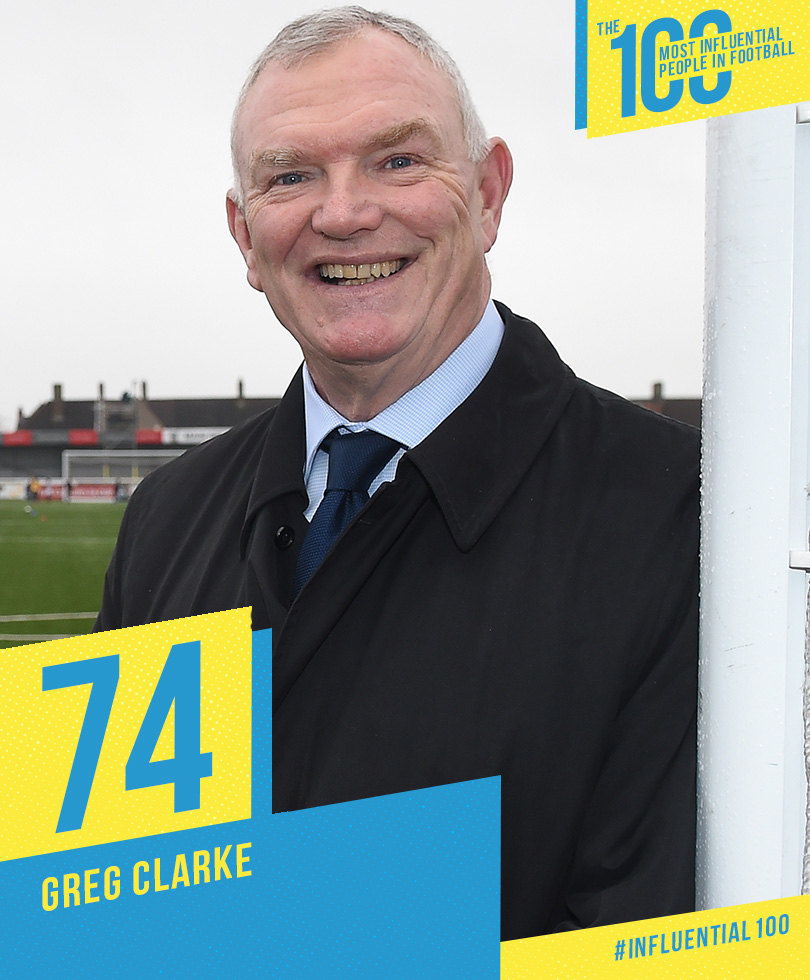
A businessman with a corporate background, his first professional foray into the sport came when he joined Leicester’s board in the mid-90s. In 2002 he was a leading figure, alongside Gary Lineker, in the consortium that took over the club as it teetered on the brink of oblivion.
In 2010, three years after handing over the Leicester baton to Milan Mandaric, Clarke was appointed chairman of the Football League, and after a six-year spell there – during which his commercial nous was applied usefully – he was promoted once again to the head of English football’s governing body, the FA, when his namesake Dyke stepped down in the wake of the national team’s shambolic outing at Euro 2016.
By now, then, Clarke is pretty much at home in English football’s corridors of power. His specialism is, by his own admission, in business and commerce rather than football’s technical side – but in a game where the two are becoming increasingly inextricable, perhaps it’s little surprise that it’s he, rather than a retired manager of former player, who presides over the future of English football. AH
73. Peter Kenyon
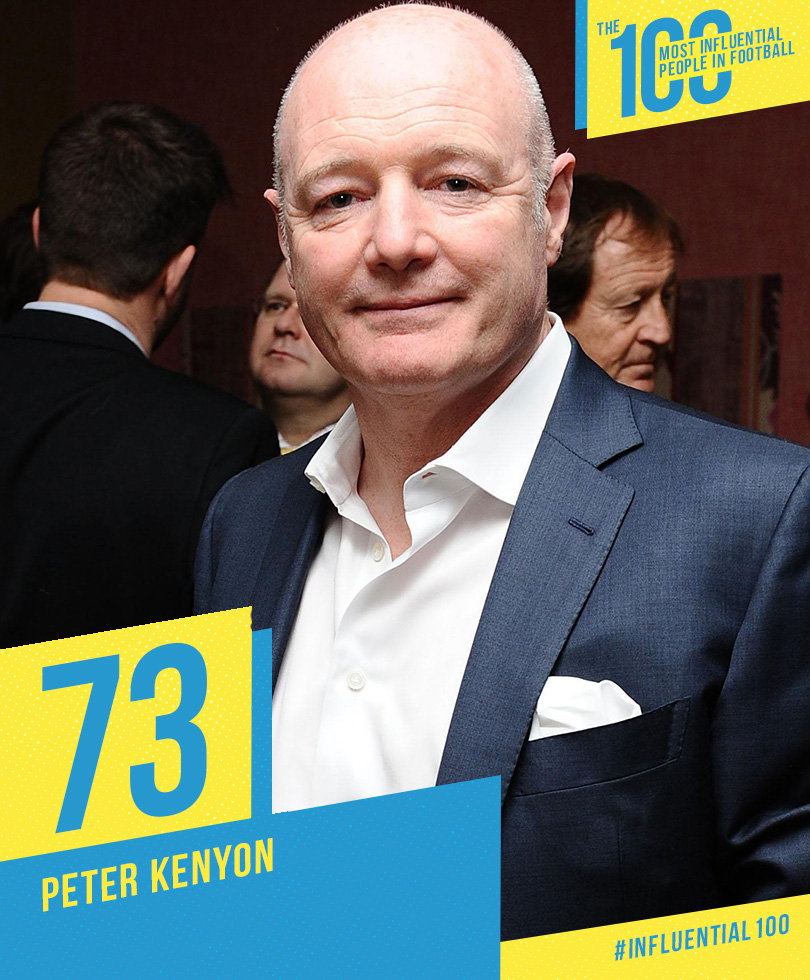
The businessman made his name at Manchester United in the early 2000s, when he helped convince Alex Ferguson to change his mind about retirement. He sanctioned the breaking of United’s strict wage structure for the acquisitions of Rio Ferdinand and Juan Sebastian Veron, but actually put the club on a more secure financial footing with lucrative sponsorship deals.
The lifelong United supporter then moved to Chelsea, before leaving in 2009. Since then, he’s embarked on a career in player representation in association with super-agent Jorge Mendes, and works as a gun-for-hire for various clubs looking to make their financial situation more stable. He’s worked in an advisory role at Middlesbrough and Atletico Madrid – he helped the Spanish side clear a multi-million pound debt and hang on to some of their big names.
Now, he’s reportedly acting in an advisory role for Inter’s new Chinese holders. It’s rumoured they want to poach manager Diego Simeone from Atletico as part of an attempt to get back to the top of European football. AK
72. Kia Joorabchian
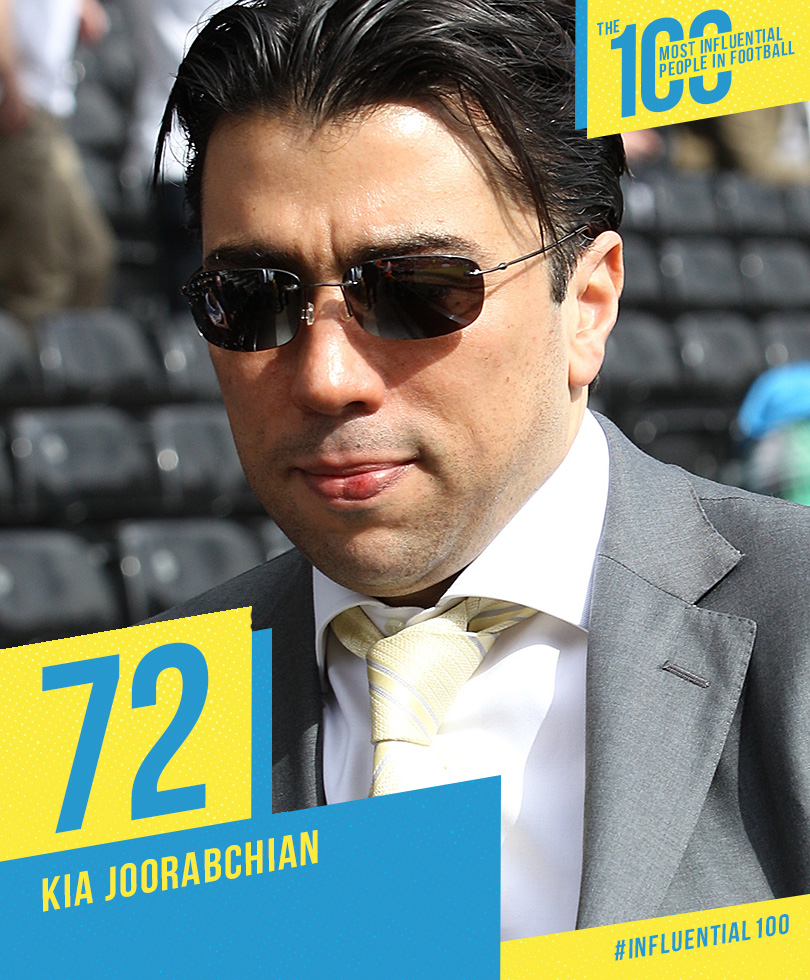
Joorabchian was catapulted into football’s consciousness in 2007 when Carlos Tevez and Javier Mascherano turned up, dazed and disorientated, at Upton Park in a transfer that was later found to have utilised illegal strategies of third-party ownership.
The self-styled super agent, then a figure of great infamy, has receded into the relative background in the years since, but that’s not to say he hasn’t been a busy boy: his client list features a great many of South America’s most high-profile players, and the recent mass-migration of superstars to the moneyed confines of the Chinese Super League has certainly not done his bank account any harm.
Joorabchian has also become an unofficial advisor at Inter – with the club having recently been taken over by a Chinese consortium – and played a key role in the summer’s transfer of Joao Mario, whose £38m price tag represented the record domestic sale from a Portuguese club.
As China’s financial tentacles continue to spread across the football world, Joorabchian’s role as one of the sport’s chief power-brokers is only like to increase. AH
71. Jaume Roures

A former sports journalist turned filmmaker, Roures founded Mediapro in 1995 and the company now holds the international rights to La Liga, plus Champions League and Europa League coverage in Spain. The current deal with the LFP is worth around £1.8bn over three years and runs through to the end of the 2018/19 season.
However, Mediapro’s influence doesn’t quite stretch as far as many in the paranoid world of Spanish football would like to believe. When Real Madrid came from 2-0 down to beat Villarreal in March, an almighty row developed – triggered by Gerard Pique on Twitter, predictably – about refereeing decisions, which then became a debate about television replays and a perceived anti-Madrid bias in the portrayal of key decisions.
That prompted Roures to step in, backed up by Movistar narrator Carlos Martinez, and make everyone aware that the actual pictures were controlled by La Liga, not the TV companies. MH
100-91 • 90-81 • 80-71 • 70-61 • 60-51 • 50-41 • 40-31 • 30-21 • 20-11 • 10-1
Greg Lea is a freelance football journalist who's filled in wherever FourFourTwo needs him since 2014. He became a Crystal Palace fan after watching a 1-0 loss to Port Vale in 1998, and once got on the scoresheet in a primary school game against Wilfried Zaha's Whitehorse Manor (an own goal in an 8-0 defeat).
 Join The Club
Join The Club






